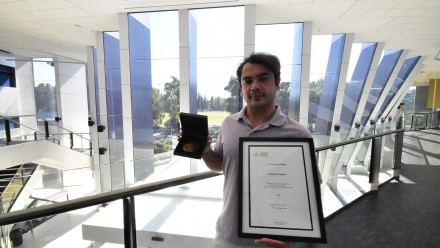About
The ANU Centre for Therapeutic Discovery (ACTD), formerly the Target and Drug Discovery Platform, is a state-of-the-art robotic and liquid handling facility specifically designed for high-throughput screening, biomarker and therapeutic discovery, funded by ANU, The Australian Cancer Research Foundation (ACRF) and ACT Health. Located within the Biomolecular Resource Facility at the John Curtin School of Medical Research, this platform will allow researchers to perform high throughput screens to identify novel treatments for cancer and other diseases. This facility was opened in February 2017 and is the first of its kind in the ACT and amongst a handful of other screening facilities around Australia.
What can the platform do?
The ACTD has been designed to suit a variety of different screening requirements. It is comprised of two separate workstations: a high throughput screening workstation and a high content/imaging workstation. Both of these workstations are equipped with robotic arms and liquid handling instruments that will allow researchers to perform a variety of different tasks (e.g. seeding cells into microplates and performing drug treatments) on a large scale. Access to robotics to perform these tasks reduces the time it takes to undertake these large-scale experiments, thus significantly speeding up the target discovery process.
Projects using this platform can lead to:
- Finding new therapeutic targets and biomarkers
- Repurposing existing drugs to treat other diseases
- Identifying drug combinations and synergies to optimise treatment
- Understanding cell biology
- Providing a platform for discovery and early development of novel biologically active compounds to treat human disease
Why is it important?
Outcomes for many cancer patients remain dismal. For example, there have been no major improvements in pancreatic cancer in the last 20 years with only 20% of patients surviving one year after diagnosis, and an overall five-year survival rate of 5%. There is an urgent need to develop new approaches and drugs for the early detection and treatment of cancer and to re‐think and re-invigorate the early stages of drug discovery.
High throughput screening techniques have revolutionised drug discovery research in recent years. The high throughput robotics and equipment provide automation for previously slow, manual processes, enabling researchers to conduct large-scale experiments evaluating hundreds of thousands of compounds within a few weeks or even days. These screens can quickly identify which compounds produce an active biological effect, providing valuable starting points for drug discovery and development. Access to this equipment will enable researchers to find effective treatments for the disease more quickly.
Our goal, with support from ACRF, is to make a tangible and enduring impact on improving cancer patient outcomes through discovery-based programs and translational research. The new ACTD screening facility will not only support critical cancer research at JCSMR but will also provide new opportunities for researchers at ANU, the University of Canberra and other institutions in the ACT.
Read more about the future of cancer research and tailored cancer treatments.
Funding
The ANU Centre for Therapeutic Discovery has been made possible with a $2 million grant awarded by the Australian Cancer Research Foundation (ACRF) to PI Professor Ross Hannan and colleagues, and generous support from the ANU Chancellery, John Curtin Medical Research Foundation and ACT Health.











